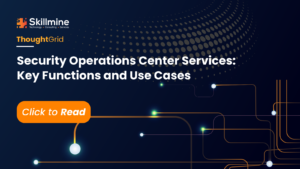A leading Telecom business in India needed a solution that provides critical surveillance and monitoring services to their customers. Adopting an NOC management solution helped this organization quickly implement an optimum performance management solution for numerous customer devices. This in turn helped them deliver a strong operational management solution to its customers through the NOC solution.
What is a NOC?
A network operations center (NOC) serves as a hub for enterprise IT. The network operations center team members supervise, monitor, and maintain an enterprise’s services, databases, external services, firewalls, and networks. With a thorough understanding of how a NOC operates, your company is well-positioned to maximize its performance.
What is a NOC team?
Engineers on the NOC team track and manage endpoints. NOC team engineers have also established processes, protocols, NOC tools and procedures for identifying and resolving IT infrastructure incidents for identifying and resolving IT infrastructure incidents. As a result, NOC team engineers know exactly what to do to resolve it as quickly and efficiently as possible when an incident occurs.
Essential Components of NOC
Centralized Knowledge: A knowledge base serves as a centralized repository for all documentation and information, ensuring easy accessibility for every team member. Continuously updated, this centralized knowledge hub offers a singular location for relevant information and retains critical incident data to mitigate potential damage from recurring issues.
Ticketing System for Tracking: Ticketing systems meticulously track all issues, assessing their urgency and severity, and assign responsibilities accordingly. Issues are documented within tickets, providing a detailed description for efficient processing and assignment to the appropriate personnel or departments. If a task cannot be completed by a specific department or individual, it can be escalated to the next level.
Reporting for Incident Measurement and Improvement: Regular reporting on a daily and monthly basis is crucial. Daily reports should encompass the previous 24 hours and include all significant incidents along with their resolutions and root causes. These reports provide insights into NOC activities, highlight significant issues, and identify trends requiring attention.
Automation of IT Processes: Network Operations Center offers opportunities to automate repetitive daily tasks, thereby freeing up time for the IT team to focus on other services such as disk space cleanup, password resets, and service restart management.
Communication Process Within A NOC
Incident Management: NOC engineers are responsible for managing incidents and addressing complaints related to network issues. Additionally, they handle requests for updates, reports, new orders, and any other tasks pertinent to NOC services.
Escalation: In instances where standard troubleshooting methods prove ineffective, shift supervisors or NOC engineers oversee escalations. They ensure that escalated issues are promptly addressed to minimize downtime.
Prioritization: Shift supervisors play a key role in prioritizing tasks within the NOC. They monitor tickets and incidents, assigning them based on their level of importance and urgency to ensure that critical tasks are completed within established deadlines.
NOC Vs SOC: Which is better?
The NOC vs. SOC debate has been going on for some time, but both operations centers play critical roles in an enterprise’s success.
A network operations center team provides technical assistance. Among the key responsibilities are:
Endpoint management and monitoring
Identification, classification, and resolution of incidents
Installation and administration of software
Email management
Backup and storage administration
Patch management
Threat assessment
IT performance monitoring
A SOC is solely concerned with security, and it guards against ransomware, malware, and other cyberattacks. Analysts who monitor and evaluate an enterprise’s applications, networks, websites, and other systems are also part of a SOC team. SOC analysts investigate any suspicious activity detected on enterprise systems. If SOC analysts discover that an enterprise has been breached, they can handle the incident immediately.
NOC and SOC work together to help your business thrive. Together they monitor and troubleshoot IT infrastructure and security issues. As a result, finding ways to optimize your NOC and SOC assist you in improving your business.
Can NOC improve data center availability?
A NOC data center team monitors data center availability — often in real-time. It collects data and analyzes it to identify trends and patterns in availability. With this information, a NOC data center team can find ways to improve uptime, meet SLAs, and provide the support its stakeholders deserve.
Finally, your network operations center team can improve data center availability in a variety of ways, including:
Monitoring your computer network and telecom infrastructure
Taking care of your IT infrastructure
Detection and resolution of incidents
Data backup and storage
5 NOC best practices
- There are numerous tried-and-true best practices, such as:
- Always keep an eye on your information and network systems.
- Create processes, protocols, and procedures for incident response and remediation.
- Create and use escalation groups for incident alerts.
- Make use of an incident classification system.
- Obtain and evaluate NOC performance data regularly.
Conclusion:
NOCs can detect problems before they happen, mitigate user impact, and automate cross-team workflows for resolution. Skillmine Technology Consulting is one of the best NOC Services Providers to partner with. Contact us to learn more. Optimizing your NOC necessitates using technology that can meet the demands of today’s network volume while also identifying and resolving issues.
Looking for expert technology consulting services? Contact us today.





